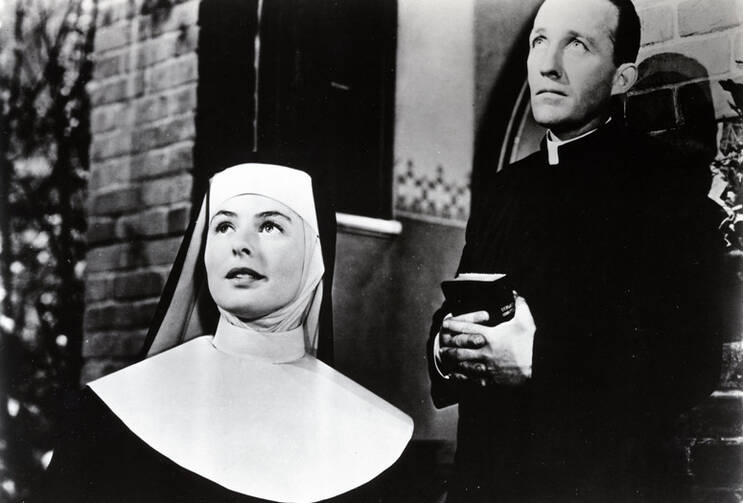Hollywood isn’t always kind to nuns. ‘The Bells of St. Mary’s’ was an exception.
The Catholic Movie Club is a short weekly essay pulling out spiritual themes in our favorite films. You can discuss the movies with other readers in the comments on this page or in our Facebook group. Find past Catholic Movie Club selections here.
Hollywood hasn’t always been kind to sisters.
Most often they appear as figures of terror or titillation: the “Nunsploitation” subgenre is prolific enough to have a name (and a Wikipedia entry). These caricatured or fetishized images of sisters are a far cry from the real sisters I, and probably you, have known: women who formed, nurtured and deepened our faith, women whose service and leadership helped us feel at home in the church. It’s rare to see those sisters represented in films.
What’s most extraordinary about Sister Benedict—and depiction of religious life in “The Bells of St. Mary’s”—is that she lives her vocation joyfully.
“The Bells of St. Mary’s” (1945)—directed by Leo McCarey, with a screenplay by Dudley Nichols—is one of those rare examples.
When Father Charles O’Malley (Bing Crosby, reprising his role from “Going My Way,” for which he won the Academy Award in 1944) takes over as pastor at the titular parish, his housekeeper offers a dire warning about the sisters who run the dilapidated parochial school: “I can see you don’t know what it means to be up to your neck in nuns.” When he meets them they aren’t hostile, but they aren’t exactly impressed either. This is even more true for the formidable Mother Superior, Sister Benedict (Ingrid Bergman, coming off of her own Oscar win for “Gaslight”), who grew up scuffling with boys and playing baseball in Minnesota and displays none of the automatic deference a priest might expect.
In “Going My Way,” Father O’Malley reinvigorated an ossified parish with his unorthodox style; in “Bells,” he’s the one who has something to learn. Despite differences in educational philosophy, Father O’Malley and Sister Benedict soon come to respect each other as partners. Father O’Malley has the humility to realize that Sister Benedict knows his new flock better than he does, and learns to trust her judgment. There are also a few instances where Father O’Malley’s compassionate style of ministry softens some of Sister Benedict’s hard lines, although pointedly he never uses his authority to make her conform to his way of doing things. When the two come to an agreement, it is always the fruit of mutual discernment.
Sister Benedict embodies the capability and deep faith of the real sisters who dedicate their lives in (sometimes underappreciated) service to God’s people. She uses humor and creativity to educate her students: allowing first graders to perform an unpolished (but sweet and honest) Nativity pageant and offering a bullied boy boxing lessons. She also demonstrates radical trust in God, even when things go wrong. Late in the film she receives some devastating news, but after a moment accepts it as an expression of her vow of obedience. (It’s funny, considering how many films there are about Jesuits, that this may be the best cinematic depiction of Ignatian indifference.)
What’s most extraordinary about Sister Benedict—and depiction of religious life in “The Bells of St. Mary’s”—is that she lives her vocation joyfully, filled with the light of someone who knows they are exactly where God means them to be. When a student says she wants to become a sister to escape the turmoil of her life, Sister Benedict counsels her: “You don’t become a nun to run away from life, Patsy. It’s not because you’ve lost something. It’s because you’ve found something.”
This month in Catholic Movie Club we’re focusing on movies set at schools, so it only felt appropriate to start with a classic Catholic school movie—and to celebrate the women who, for many of us, are synonymous with Catholic education. (For the record, my grade school teachers were IHMs.) Sisters don’t always receive due respect from Hollywood—or, frankly, the church at large. Maybe a film like “The Bells of St. Mary’s” can remind us of how important they are, to our faith and to the world.
“The Bells of St. Mary’s” is streaming for free with ads on Tubi and the Roku Channel.




No comments:
Post a Comment